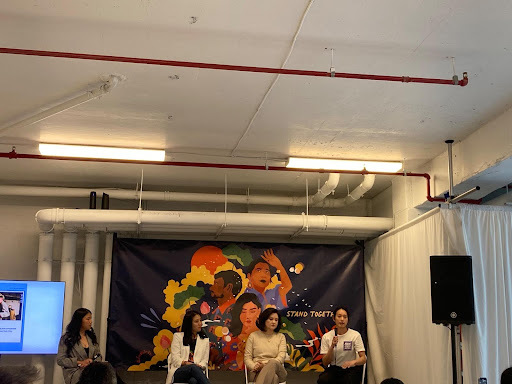On the first sunny day of March, as the weather permitted outdoor activities, a group of activists decided to mark the third anniversary of the anti-Asian shooting that took place in Atlanta, Georgia back in 2021. A small venue located between a deli and an ice cream shop housed 50 people who came to commemorate together as members of the Asian American Community.
“I am afraid that because it’s super sunny outside, not a lot of people will come,” said Diana Suryakusuma from the Stand With Asian American Foundation. “About 50 people should come. At the first commemoration we had about 300 people.” For the other anniversaries, it took place in Times Square so that more people could attend, but this year it changed. “We wanted something more intimate,” Suryakusuma said.
“Today, we are here to remember this sad tragedy. A man shot eight people and claimed that he had a sexual addiction to Asian people. This shooting was not mass-related, it was race-related,” said Brian Pang. He is on the board of the Stand With Asian American Foundation, and came from Vancouver, Canada for the commemoration.
This meeting was also the time to mention all the violence and discrimination that Asian Americans are facing. Firstly, the foundation showed the results of the survey they just took regarding how Asian Americans felt in New York City in 2023. The three problems identified by the survey are: Asian Americans are attacked because of their identity, they don’t feel safe in New York, and there are barriers to reporting attacks.
Over half of NYC’s Asian American population reported being insulted, harassed, threatened, or physically attacked in 2023 because of their race or ethnicity. 83% of Asian American women are concerned about their public safety in New York City. “What we are currently living has disappeared from the mainstream media, but it is still very much present in our lives,” said Eugena Oh, New York regional director of The Asian American Foundation.
Another key problem the survey pointed out was that over 80% of Asian Americans who experienced a hate incident didn’t know they could report it, how to report it, and/or felt uncomfortable reporting to law enforcement or other officials. “How can we address this problem? There is a lack of access to the system, the people don’t know how to report,” said Oh. “A lot of people don’t speak English as their first language.”
There is a huge language barrier to reporting the crimes that Asian American people have been victims of. To report a crime, to be able to talk about something traumatic, it needs to be in a language where they are comfortable talking. If victims are to report what has happened to them, structures should be better adapted to their needs, with interpreters for example. Especially as Asian Americans are a growing part of the New York population, accounting for 18% of the total. “The structures need to be more accessible, the structures should protect all of us, not some of us,” said Oh.
After those words, a hate crime survivor took the floor. Esther Lee is an educator and activist against Asian discrimination. She was a victim in the subway of a hate crime. “Someone spitted on me, verbally assaulted me, told me that I was a carrier,” said Lee, who’s attacker associated her ethnicity with COVID-19. “I am a survivor and what happened to me, I want to get it heard,” said Lee.
When she went to report to the police, the officer answered that it was not a hate crime. “There is something wrong with the reporting system, the police officer didn’t want to do the paperwork,” said Lee. According to her, police officers should be more educated and aware of the discrimination that people of color face. “Wouldn’t it be nice that they understand the oppression of Asian American women,” said Lee. “Let’s be clear: being an Asian woman on the train is an easy target, we are hypersexualized.”
The Asian American community continues to face a lot of stereotypes, and post-pandemic, there is a lingering lack of cultural awareness regarding the Asian American community. To fight against these stereotypes that lead to much violence against the Asian community, education is the key. The first step is that people are aware of the problem, and dare to talk about it as they did at this meeting — so that more and more people are aware of the discrimination suffered by people from the Asian American community.












[…] READ MORE […]